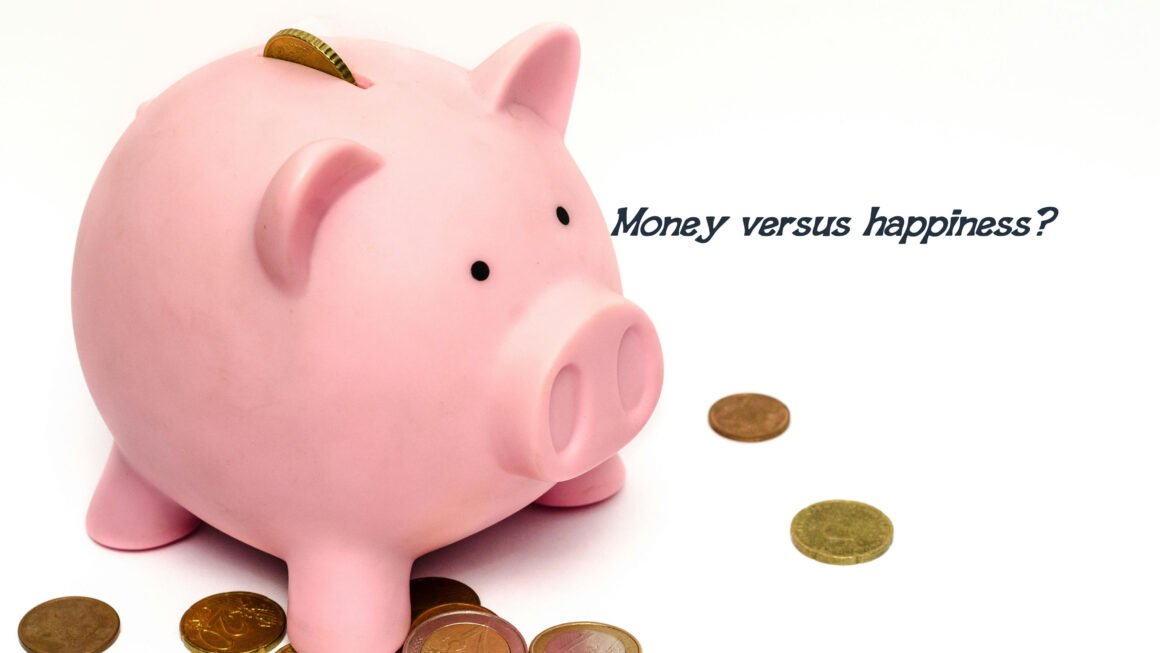The idea of a tradeoff between money and happiness is a long-standing debate. Many believe that pursuing wealth comes at the expense of fulfillment, while others argue that happiness means settling for less financial stability.
When I was younger and before I got married I had a boyfriend that played football, not because he wanted to but because his father wanted him to play. Over time he started to really hate playing football when he really wanted to do theater like a lot of friends where part of.
However, this perceived conflict isn’t as black-and-white as it seems. You don’t necessarily have to choose between money and happiness. Instead, you can design a life where financial security and personal fulfillment coexist, provided you approach the relationship between the two with clarity, intentional, and balance.
Understanding the Relationship Between Money and Happiness
Money and happiness are undeniably linked, but their connection is more complex than a simple cause-and-effect relationship. Research suggests that money contributes to happiness up to a certain point—typically by meeting basic needs like food, shelter, healthcare, and security.
Beyond this threshold, additional income has diminishing returns on happiness, particularly when it’s not aligned with your values or goals. Money offers freedom, security, and opportunities, which are foundational to well-being.
For instance, having enough money allows you to choose where you live, the work you do, and the experiences you prioritize. However, the pursuit of money for its own sake can lead to stress, overwork, and neglect of the things that truly bring joy—like relationships, personal growth, and leisure.
On the other hand, happiness often comes from intangible sources like connection, purpose, and self-expression. These elements aren’t inherently tied to financial wealth, but they do require time, energy, and presence. When money is pursued at the expense of these factors, it can create a sense of emptiness, even in the midst of material success.
The Myth of the Either-Or Mentality
The “money versus happiness” debate often assumes that you have to sacrifice one for the other. This binary mindset can lead to extreme choices—either prioritizing high-paying but unfulfilling work or opting for passion-driven pursuits that might not sustain your financial needs.
However, life doesn’t have to be an either-or scenario. By aligning your financial goals with your values and lifestyle, you can achieve a balance that supports both financial stability and personal happiness.
For example, someone might choose a moderately paying career that aligns with their passion and offers work-life balance, rather than chasing a high-income role that demands long hours and high stress.
Another person might focus on building financial freedom through entrepreneurship, allowing them to create a flexible schedule that supports their personal priorities. The key is to reject the false dichotomy that money and happiness are mutually exclusive. Instead, treat them as complementary elements of a well-rounded life.
How to Align Money and Happiness
1. Define Your Personal Values and Priorities
Start by identifying what truly matters to you. Is it freedom, security, creativity, relationships, or adventure? Understanding your core values helps you determine how money fits into your vision of happiness.
For instance, if freedom is a priority, you might value having a flexible work schedule over a higher paycheck. If security is important, you might focus on building a financial cushion before pursuing riskier opportunities.
Write down your top priorities and assess how your current financial choices support or hinder them. This clarity helps you make decisions that align with both your monetary goals and your happiness.
2. Redefine Success on Your Terms
Society often equates success with financial wealth, but this definition doesn’t resonate with everyone. Redefine success based on your unique values and aspirations. For example, success for you might mean having the freedom to travel, spending quality time with loved ones, or building a career that reflects your passion.
When you measure success by your own standards, you can focus on what brings you fulfillment without being swayed by societal pressure to prioritize money above all else.
3. Prioritize Experiences Over Material Goods
Research shows that experiences contribute more to long-term happiness than material possessions. Vacations, hobbies, and time spent with loved ones create lasting memories and emotional connections, while material goods often lose their novelty over time. For example, a family trip might bring more joy and bonding than upgrading to the latest smartphone.
When making financial decisions, consider whether your spending aligns with experiences that enhance your happiness. Shifting your focus to experiences doesn’t mean abandoning financial goals—it’s about using your resources in ways that enrich your life.
4. Create a Work-Life Model That Supports Both
Your work-life balance plays a critical role in balancing money and happiness. If your career demands leave little room for personal fulfillment, it’s worth reassessing whether the tradeoff is sustainable. Consider alternative work models, such as remote work, flexible schedules, or entrepreneurship, that allow you to prioritize both income and well-being.
For example, someone who values creativity might explore freelance work or a side hustle that aligns with their passion, while someone who values family might seek a role with predictable hours and generous time off.
5. Build Financial Security Without Overworking
Financial security reduces stress and creates a foundation for happiness, but overworking to achieve it can backfire. Focus on building a sustainable financial plan that doesn’t rely on sacrificing your personal life. This might include:
• Saving consistently to create an emergency fund or long-term investments.
• Living within your means to avoid debt and reduce financial pressure.
• Exploring passive income opportunities to generate additional revenue without extra hours.
By achieving financial stability, you create space to focus on relationships, health, and personal growth—all of which contribute to happiness.
6. Focus on Meaningful Work
Work is a significant part of life, and its impact on your happiness depends on how well it aligns with your values. Meaningful work—whether it’s through a career, business, or creative pursuits—can be a source of deep satisfaction. It doesn’t necessarily have to be your passion, but it should resonate with your sense of purpose and allow you to contribute in a way that feels fulfilling.
For example, someone might find meaning in teaching because it allows them to inspire and support others, even if the salary isn’t the highest. Another person might find fulfillment in building a business that aligns with their vision, even if it requires taking financial risks initially.
7. Manage Comparison and External Pressures
One of the biggest obstacles to balancing money and happiness is the pressure to compare yourself to others. Social media and societal norms can create unrealistic expectations, leading you to prioritize financial milestones or lifestyles that don’t truly align with your goals.
Remind yourself that everyone’s path is different. Focus on what brings you joy and aligns with your values, rather than trying to meet external benchmarks. For example, you might choose to live in a smaller home or drive a modest car to free up resources for travel or personal projects.
Recognizing When Tradeoffs Are Necessary
While it’s possible to align money and happiness, there are times when tradeoffs are unavoidable. For example, you might need to take a less fulfilling job temporarily to pay off debt or save for a major goal. Similarly, you might need to cut back on spending to achieve long-term financial security.
The key is to approach these tradeoffs intentionally, with a clear understanding of their purpose and timeline. Temporary sacrifices are easier to navigate when you know they’re serving a larger goal that aligns with your values.
Creating a Life Where Money and Happiness Coexist
Balancing money and happiness isn’t about perfection—it’s about intent. By clarifying your values, redefining success, and making financial decisions that align with your priorities, you can build a life where both coexist. This approach allows you to pursue financial security while prioritizing the relationships, experiences, and purpose that bring you lasting fulfillment.
You don’t have to choose between money and happiness. By aligning your resources with your vision for life, you can create a model where financial stability supports your joy and well-being, rather than competing with it. It’s not about how much money you make—it’s about how intentionally you use it to create the life you truly want.
To end the story about my boyfriend and playing football because his father wanted him to play. He ended up getting hurt, and he used that reason to stop playing. He didn’t really have to stop, after he got better he could of gone back to playing football. But he decided that he had to tell his father he hated football and wanted to be with his friends in theater. He got his wish, but he knew he really disappointed his father, and that stuck with him for years. When you are trying so hard to please a family member, you can lose yourself instead. Crazy thing is, I was watching a movie a few years ago, and there was my ex-boyfriend was it as a bit player. He got what he wanted for sure after all. 😀




